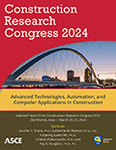Hot Thermal Discomfort-Related Action Recognition Model Validation in Outdoor Construction Environments
Publication: Construction Research Congress 2024
ABSTRACT
Hot thermal discomfort poses significant risks to construction workers in hot environments, necessitating effective measures to mitigate heat-related illnesses. This study validates the applicability of a thermal discomfort action recognition model in outdoor construction environments, addressing gaps in existing research. The methodology comprises four steps: data collection, model training, application, and evaluation. The data collection was implemented by the acquisition of video data depicting hot discomfort-related actions within indoor setting. Subsequently, this video dataset served as the foundation for training a thermal discomfort action recognition model using deep learning-based classifier. The model’s performance was rigorously evaluated in real-world outdoor scenarios, specifically in construction environments. Results indicate limited accuracy (0.5833) in predicting hot thermal discomfort-related actions outdoors, highlighting the need for further model refinement. However, a detailed analysis based on different angles and postures provides valuable insights for future improvement. The study emphasizes the importance of diverse datasets encompassing various angles and postures to develop a sophisticated model for accurately recognizing hot discomfort actions in outdoor construction environments. These findings will contribute to enhancing the existing hot thermal discomfort model’s accuracy when the model is applied to outdoor construction fields, ultimately improving worker safety and well-being.
Get full access to this article
View all available purchase options and get full access to this chapter.
REFERENCES
Arakawa Martins, L., V. Soebarto, and T. Williamson. (2022). “A systematic review of personal thermal comfort models.” Build Environ, 207: 108502. https://doi.org/10.1016/j.buildenv.2021.108502.
Bucarelli, N., and N. El-Gohary. (2023). “Deep learning approach for recognizing cold and warm thermal discomfort cues from videos.” Build Environ, 110277. https://doi.org/10.1016/j.buildenv.2023.110277.
Dong, X. S., G. H. West, A. Holloway‐Beth, X. Wang, and R. K. Sokas. (2019). “Heat‐related deaths among construction workers in the United States.” Am J Ind Med, 62 (12): 1047–1057. https://doi.org/10.1002/ajim.23024.
Duan, W., Y. Wang, J. Li, Y. Zheng, C. Ning, and P. Duan. (2021). “Real-time surveillance-video-based personalized thermal comfort recognition.” Energy Build, 244: 110989. https://doi.org/10.1016/j.enbuild.2021.110989.
Li, K., J. Wang, R. Yu, and W. Xue. (2022). “Non-invasive thermal sensation recognition based on human behavior postures in office environment.” 2022 41st Chinese Control Conference (CCC), 6714–6719. IEEE.
Jacklitsch, B., W. J. Williams, K. Musolin, A. Coca, J.-H. Kim, and N. Turner. (2016). NIOSH criteria for a recommended standard: occupational exposure to heat and hot environments. Cincinnati, OH: US Department of Health and Human Services, Centers for Disease Control and Prevention, National Institute for Occupational Safety and Health,.
Qian, J., X. Cheng, B. Yang, Z. Li, J. Ren, T. Olofsson, and H. Li. (2020). “Vision-based contactless pose estimation for human thermal discomfort.” Atmosphere (Basel), 11 (4). MDPI AG. https://doi.org/10.3390/ATMOS11040376.
Roelofsen, P. (2016). “A computer model for the assessment of employee performance loss as a function of thermal discomfort or degree of heat stress.” Intelligent Buildings International, 8 (4): 195–214. https://doi.org/10.1080/17508975.2015.1011071.
Song, K., K. Kang, and B.-C. Min. (2022). “Recognition of Occupants’ Cold Discomfort-Related Actions for Energy-Efficient Buildings.”2022 9th International Conference on Construction Engineering and Project Management (ICCEPM), Las Vegas, NV, USA.
Tang, T., Y. Zhang, Z. Zheng, X. Zhou, Z. Fang, and W. Liu. (2021). “Detailed thermal indicators analysis based on outdoor thermal comfort indices in construction sites in South China.” Build Environ, 205: 108191. https://doi.org/10.1016/j.buildenv.2021.108191.
Wang, L., Y. Xiong, Z. Wang, Y. Qiao, D. Lin, X. Tang, and L. Van Gool. (2016). Temporal Segment Networks: Towards Good Practices for Deep Action Recognition.
Xu, M., Y. Han, Q. Liu, and L. Zhao. (2022). “Action-based personalized dynamic thermal demand prediction with video cameras.” Build Environ, 223. Elsevier Ltd. https://doi.org/10.1016/j.buildenv.2022.109457.
Information & Authors
Information
Published In
History
Published online: Mar 18, 2024
ASCE Technical Topics:
- Business management
- Construction engineering
- Construction management
- Data collection
- Employment
- Engineering fundamentals
- Engineering mechanics
- Labor
- Methodology (by type)
- Model accuracy
- Models (by type)
- Occupational safety
- Personnel management
- Practice and Profession
- Public administration
- Public health and safety
- Research methods (by type)
- Safety
- Thermal analysis
- Thermodynamics
- Validation
Authors
Metrics & Citations
Metrics
Citations
Download citation
If you have the appropriate software installed, you can download article citation data to the citation manager of your choice. Simply select your manager software from the list below and click Download.
